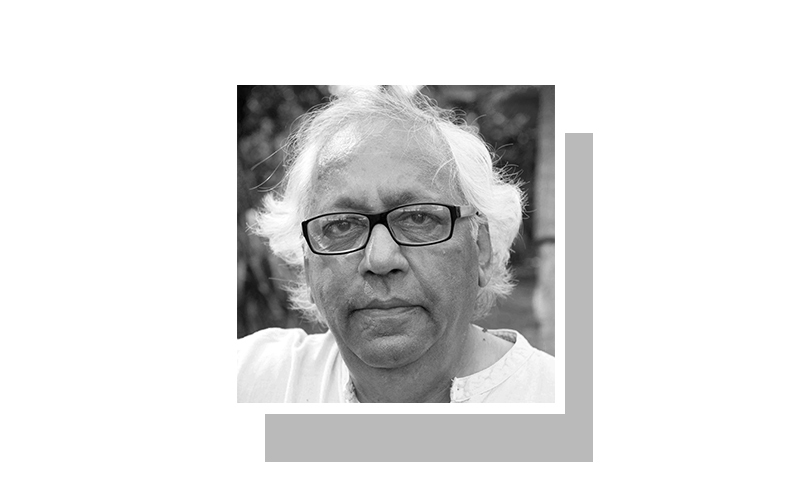Recently, Bilawal Bhutto Zardari, co-chairman of the PPP, apologised to disillusioned supporters for the mistakes his party had made, and promised amends.
As the catalogue of errors of omission and commission is so long and embarrassing, I can understand why he didn’t go into any detail. Having supported the party since long before Bilawal was born — and now despairing of its resurrection — I consider myself qualified to ask its leadership a few questions.
At a time when the country is going through a major political crisis, the PPP has no role to play. Part of the reason, of course, is that it has now been reduced to a small provincial party, happy in its comfort zone of Sindh where its voters demand very little and get even less.
According to a recent news report, at a rally Bilawal shouted “Marsoon, marsoon, Punjab na daysoon!”, or he would rather die than give up Punjab. Would he care to share his strategy with us? For over 20 years, the PPP has been steadily squeezed out of Pakistan’s biggest province. Now, it barely exists there as a political force, thereby foregoing any role in the Nawaz vs Imran tussle.
The PPP’s out of the national spotlight.
But the electoral reality is that if a party does not have a strong presence in Punjab, it cannot hope to get into power in Islamabad. By handing over provincial party matters to somebody like Jahangir Badar, first Benazir Bhutto and then Asif Zardari dug a hole the party is unlikely to emerge from.
Bilawal also announced he would get every inch of Kashmir for Pakistan. This statement was embarrassing in its sheer immaturity: if Bilawal wants a reality check — he certainly needs one — he should look at some of the comments that appeared in the Indian media and on social networks.
In our part of the world, politicians often make grandiose promises: witness Nawaz Sharif’s election pledge to end power shortages in a year; Imran Khan’s promise to give every Pakistani a job; and Tahirul Qadri’s vow to end poverty overnight. Sadly, far too many Pakistani voters are gullible enough to fall for these gimmicks.
But Kashmir? I doubt very much that people in rural Sindh or Punjab are holding their breath to be united with a region they don’t know or care much about. And has Bilawal ever stopped to consider what the people of Kashmir feel about unification with Pakistan? Over the last couple of decades, most Kashmiri nationalists have been struggling for independence, not union.
I won’t even get into a discussion about the stench of corruption that has hung heavily over the PPP each time it has been in power. And yet, despite all these allegations, not one party stalwart has ever been removed for taking kickbacks. Indeed, the rule of thumb seems to be that the more corrupt you are, the higher you can go. Raja Rental, or Raja Pervaiz Ashraf, the last PPP prime minister, apparently a case in point.
And now that the party rules Sindh, it is out of the national spotlight, and thus free to go about its business of wheeling and dealing in real estate and other scams without the media making a big deal. Other political parties also make hay while the sun shines, but at least they deliver:
Punjab under Shahbaz Sharif has made strides in education, and the MQM’s city government in Karachi did a lot of development work.
The PPP, on the other hand, is perceived as a shambolic organisation genetically incapable of governing. Its biggest achievement, the 18th Amendment devolving many federal powers to the provinces, seems to have been motivated by the knowledge that the party would soon only be in power in Sindh. So cynics see it as a profitable provision for its reduced place in Pakistani politics.
To be fair, Bilawal took a courageous stance at the time Nawaz Sharif was dragging out the futile talks with the Taliban. By demanding military action, he stuck his neck out and voiced the sentiments of the majority.
In his mea culpa, Bilawal said his party welcomed criticism from its members. Really? Since when? It has been a hallmark of the Bhutto leadership style to brook no dissent. Zulfikar Ali Bhutto was particularly autocratic, and while Benazir was a far warmer human being, even senior party members were wary of crossing her. Asif Zardari has the reputation of holding grudges against party members who do not toe the line.
There seems to be an aversion to analyse the party’s mistakes and to engage in self-analysis. No attempt seems to have been made to understand why younger urban voters have turned away from it. But instead of facing changing realities and demographics, the PPP is stuck firmly in the past, chanting outdated mantras and indulging in irrelevant politics.
Until it can somehow reinvent itself, Bilawal should get used to its diminished role.
Published in Dawn, October 4th , 2014












































